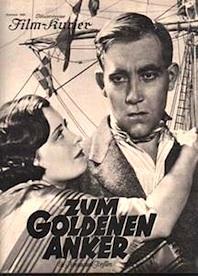| The Golden Anchor | |
|---|---|
 | |
| Directed by | Alexander Korda |
| Written by | |
| Based on | Marius by Marcel Pagnol |
| Starring | |
Production company | Les Films Marcel Pagnol |
| Distributed by | Paramount-Film |
Release date |
|
Running time | 82 minutes |
| Countries |
|
| Language | German |
The Golden Anchor (German : Zum goldenen Anker) is a 1932 German-French drama film directed by Alexander Korda and starring Albert Bassermann, Ursula Grabley, and Mathias Wieman. [1] It is the German-language version of the French film Marius (1931), also directed by Korda, and based on Marcel Pagnol's 1929 play of the same title and the first part of his Marseille trilogy. A separate Swedish-language version, titled Longing for the Sea and directed by John W. Brunius, was also released in 1931. Such multi-language versions were common during the early years of sound. It was made at the Joinville Studios by the European branch of Paramount Pictures.